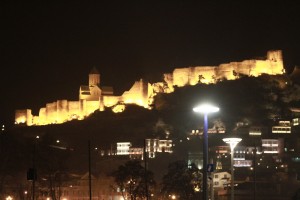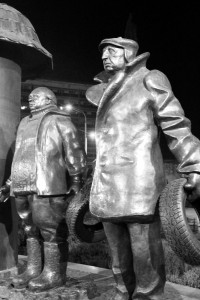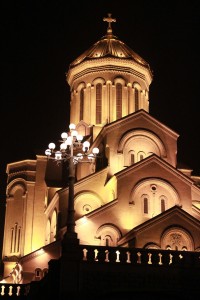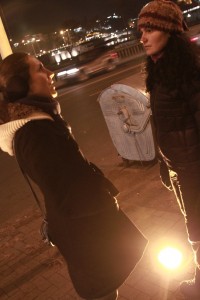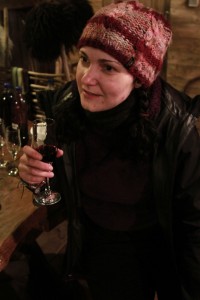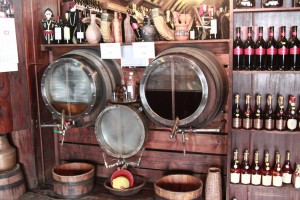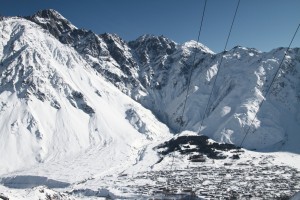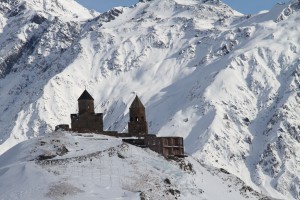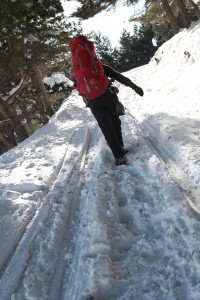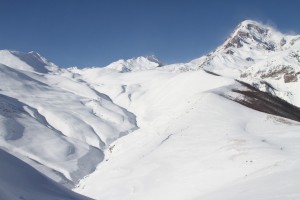We rose up early at the seashore of the Black sea while the sound of cracking boat met the peaceful waves. Pretty quickly as a rule we hitched a car or two and crossed Turkey-Georgia border at no difficulties. Another moment, and we walked the streets of Batumi, where semi-melted snow mixed with dirt did not portray the town at its best. We secretly agreed with a popular view on the places near the sea: you need the summer to enjoy the full bounty of smells, views and tastes.
The road however from Batumi, a tiny bit up north and then towards Tbilisi, is worth a pen, which sadly I wouldn’t be able to use in order to describe the beauty of the mountains snoozing silently in the distance. One car after another at a fast pace, and we are about to conclude that Georgian people are not less helpful than Turkish. Many of them, particularly the old generation smile once they hear our origin. It’s almost a duty for them to dip down the lane of memories and dig out a piece to prove the link with ‘very cultured, great’ country Lithuania. It surely gave us a sense of pride. Being an Eastern European it’s not always easy to demonstrate what you are capable of. As if some sort of a label on the jar of jam. The jam is fresh and juicy, but the label doesn’t allow to prove it until you actually open it. So Georgia which got their independence slightly earlier than Lithuania, but as it was involved in wars, and with no support from European Union, actually progresses slower. They look up and ask ‘so how art you brothers, do you manage ok?’ In fact, one driver believed ‘you need Russia. Like we do. In Soviet times, we used to get like 15% of the soviet budget. You used to get around 10% whilst the others 3-4%’. ‘Why is that so?’ we wondered. ‘They used to be afraid of Georgians. There was always a sense of rebellion in the air’.
The truck driver let us off just at the entrance to Tbilisi, and we had to hunt for an unsecured internet to reach some contacts. A random guy which later turned out to be a taxi driver gave us his mobile phone to call and even offered us a lift for free to the place we needed. ‘Do you know where we could get our hepatitis B vaccination?’ we didn’t expect the precise answer after asking such a random question. He brought us near the hospital where in the neighbouring park we pitched our tent and spent a warm night. In the morning all messed up and swollen we showed our noses outside. There were two Georgian women standing there and smiling. ‘We observed you closely’ they chatted in high pitched voices and there was a feeling of some cheerfulness. ‘You are such inspirational young people!’ they continued ‘we look at you and get so inspired. You actually live a normal life, and the others not normal’ – their Russian was clean and easy to understand.
Our connaissance with Tbilisi architecture commenced just a hundred yards away from the park we slept in. The hospital was on the verge of collapse so to say, the walls haven’t seen the paint since perhaps 50’s, the bricks and blocks were cracked and often lying in pieces. ‘I’ll show you the doctor!’ the guard felt himself very important, he pressed few of his mobile phone buttons, and had a chat with a doctor. Apparently it is still very common to get the ‘second-hand’ information. Even if the webpage or leaflets will be outdated, people would certainly get to know things via their relatives, friends or other unofficial sources. So everyone got to have that moment of being a VIP.
We entered the hospital where the chairs are worn out to their maximum, and the old woman cleaning the stairs gave us a look in a surprised but slightly (very sovietic I’d say) mad manner. ‘Reception?’ – and suddenly we felt stupid daring to ask such a question which here makes no sense at all. There is no reception, the doctors will come when they come, and you eventually get what you get. Eventually we got our second hepatitis B shot, and went on exploring Tbilisi.
There were quite a few buildings you could guess having had their moment of fame in the past, but now hybernating all in shame. To emphasise the contrast, there were numerous cars – volvos, jeeps and lexus 4×4 monsters on litterally every single step. If only you were brought to visit Tbilisi’s old town, you would never even dare to think there were some neighbouring outskirts to sadly show non full-dress view of the people’s lives. ‘The social system is sad’ explained Renata, a young Lithuanian woman married to a Georgian guy. ‘You would often see old people begging as their pensions are awfully small and if they don’t have children to support them, they are sentenced to ask for help from the passers-by’ we observed three people standing next to each other and holding their hats or hands.
‘Each time passing a temple, we have noticed, people make a sign of cross. Are Georgians that religious?’ we wondered. ‘It’s almost like a fashion out here. But indeed, the church has a strong voice over here. Even after the head of the church has paid a visit to Russia, it seemed the political situation warmed up’. She went on. ‘When Georgia was suffering from low birth rate, the patriarch promised to baptize every third child in the families. You would be surprised how the rates sky rocketed. That is how much influence religion has over here. It’s not so important if you are marrying the person from another country. What matters is how you are going to live with a person from another denomination – etc. catholic’.
We are just about to arrive at the new fresh Holy Trinity Cathedral glowing at all its beauty. Inside the woman lits a candle and then prays from a prayer book. We walk among the icons, and Renata explains a little bit more. ‘For the religious matters Georgian got the special script for holy texts. Each of the letters means something’.
That evening we finished off with Renata’s invitation to try a selection of mouth watering Georgian meals: Kinkalis with mushrooms or meat, aubergines with walnuts, kebabs and shaslyks. Our increased reaction could mean that either we appreciate the food after our modest diet, or the Georgian cuisine is certainly delicious.
The home made wine
I suppose there will always be an aspect for an ode to Georgian wine. ‘We would like to buy some wine’ I laughed loudly realizing how stupid do I sound entering the ONLY wine shop. ‘It’s a right place to visit’ smiled David, who quickly brought us to the wine tasting room. Kinsmarauli or Saperavi, a range of white wines too, and it seemed quickly we got into some dream or something. ‘Have you ever sensed that some wines have got some specific taste, for instance, the strawberries taste’, we shook our heads. So he felt a need to educate the wine illiterates. ‘Therefore people tend to grow apple trees or berry bushes closely to vineyards. Not a walnut tree in any case’ he warned, it makes the wine taste bitter’. We bought semi sweet home made Kinsmarauli to enter the new era of tastes.
Whilst we were waiting for our Azerbaijanese visa, the agency promised us to make it in 5 days. Even though it costed us 110$, we had no option but that. To apply directly you need a LoI (letter of invitation) via some official sources, which certainly was not our case.
Meanwhile we planned to bring ourselves closer to the Caucasus secrets – the foot of Kazbegi mountain.
Kazbegi
‘You are not camping outside, it’s going to be -20′, screamed in unison the driver and elderly ladies in the minibus. The old guy who was so keen to host us but once we announced we have not enough money to cover his and our needs, he got slightly angry. His drunken voice rose gradually, as he saw as being serious to pitch the tent on the snow. Truth to tell, not the cold was the challenge that night but the snow level up to the knees and higher. The tiny square close to the town hall was cleaned so we pitched our tent right at the windows of their offices.
The morning ‘aaaawww’ once we brought ourselves out of the warm tent outside. The sun was already rolling on the very top of Kazbegi, whilst other mountains were patiently waiting for their turn. We spent our last laris and tetris (Georgian money) on the mountain map and some food supplies, and finally hit the snowy path towards the tiny monastery on the top of one mountain.
The heavy steps to conquer the snow, and we reached the mysterious church. ‘Get inside and get some warmth’ commanded us one of the monks with a beard, who was tidying around the monastery. We soon entered the old church, and a little boy immediately handed me a long skirt to put over my trousers. Women in trousers are not welcomed here. The deep silence with frequently the wind squeezing through the door and bringing in some snow dust which shone brightly in the sun. We soon realized we could dry a bit our shoes and gloves, so sat down closely to the gas stove, whilst the boy stared at us from time to time. The little guardian then went to play with some tiny statues and mini icon pictures of the saints. He came back with a slim dark yellow candle and started to play on the gas stove. The pleasant scent of wax brought my thoughts somewhere close to Kazbegi…
We had our modest lunch of frozen cheese, bread and icy cucumbers. The higher peaks invited us to visit them right now, so we grabbed our camera and churchullas – vinegrape juice and nut sausages, and went on to explore the wilderness. The wind was strong at times, quickly hiding away our footsteps. We neverthelless managed to climb to the place where Kazbegi looked like a hundreds yards away, so close and scary with its icy shiny cheeks.
The beauty of Caucasus mountains forbade to talk about it any further as any words trying to describe it seems to be worthless. Full of secrets, where the mountains keep their unspoken mysteries in the monasteries.
Georgia thus surprised us with friendly welcoming but not annoyingly bothersome. The wine was delightful and the Caucasus simply blew mind away. Lithuanians do not need visas for Georgia, hence we certainly going to come back there.
We are grateful Renata Skardziute and Lina Navickaite that made our stay in Tbilisi warm and lovely!

